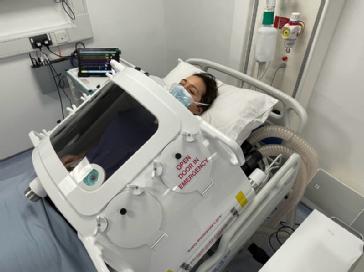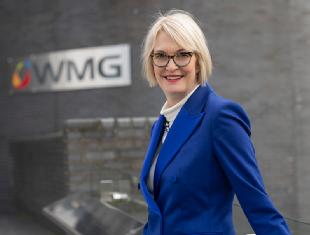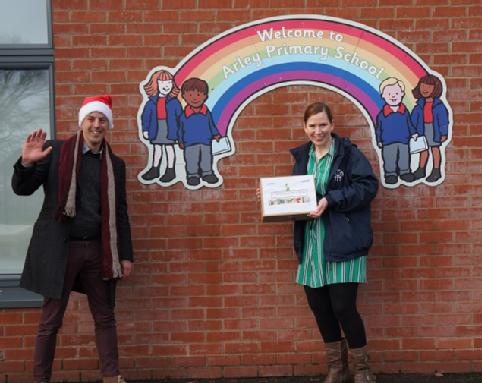WMG News
WMG High Value Manufacturing Catapult helps British taskforce develop UK negative pressure ventilator to assist recovery of COVID-19 patients
 As the UK feels the impact of the current wave of coronavirus, the exovent task force today unveils its UK negative pressure ventilator designed to assist the recovery of COVID-19 patients and for the treatment of Pneumonia and COPD.
As the UK feels the impact of the current wave of coronavirus, the exovent task force today unveils its UK negative pressure ventilator designed to assist the recovery of COVID-19 patients and for the treatment of Pneumonia and COPD.
The exovent task force formed in March 2020 in response to the COVID-19 crisis, inspired by calls from the UK Government for rapid innovation to combat the challenge presented by this highly contagious and aggressive disease. The team is composed of anaesthetists, critical care consultants, nurses, medical clinicians, engineers, academics, scientists and manufacturers.
exovent was not part of the UK Ventilator Challenge as this was conceived for positive pressure devices. Instead, the exovent team focused on exploring the benefits of negative pressure ventilation, founded upon lessons learned from nearly 100 years of Negative Pressure utilisation.
Thanks to the investment of over £1m of volunteer time, rapid engineering development and prototyping by Marshall ADG (the UK’s leading privately owned Aerospace and Defence business) and partnership with WMG High Value Manufacturing Catapult, a highly professional system is now available for approval.
The latest and most advanced iteration, the exovent-19, is ready to progress to approval by the Medicines and Healthcare products Regulatory Agency. Once approved, several leading intensive and respiratory care units stand ready to trial the system, including the Critical Care Research Team, Southampton NIHR Biomedical Research Centre (University Hospital Southampton & University of Southampton) and the Queen Elizabeth Hospital, King’s Lynn NHS Trust.
Recognising the applicability of the technology to developing countries, the team has also been partnering internationally with pioneer groups in Ghana, Bangladesh, and Ethiopia to help them develop local versions that can be approved and manufactured by them using locally sourced materials where possible. Marshall has shipped two of its protoype exovent machines designed and manufactured at its Cambridge headquarters, direct to Indian ventilator manufacturer, Skanray, who plan to use them, along with the supporting design information, to develop a relatively low cost production model that can be rapidly approved and developed for mass distribution in their local markets as quickly as possible.
exovent are hoping to come to an agreement with a UK based manufacturer in the coming weeks. In addition, the team plan to develop both a global low cost system and a paediatric low cost system working with UK engineering partners.
Speaking about the new system, exovent CEO, Ian Joesbury, stated:
“We are really excited to be unveiling this life saving system which is a cutting-edge reinvention of pre-existing technology. In the UK I believe this can form part of a longer-term plan to treat COVID-19. As the patient does not need to be anaesthetised it opens up alternative treatment options that may allow more patients to be treated outside of intensive care.”
Dr Malcolm Coulthard, from the exovent team, said:
“From research and findings to date, we firmly believe that the use of negative pressure devices can transform the patient journey for COVID-19 patients and those with pneumonia and other diseases that affect breathing. The technology is safe, simple to use and systems could be built and deployed rapidly, in both the UK and overseas. Our recent paper published in the medical journal Anaesthesia demonstrates that the exovent-19 is twice as efficient as other negative pressure systems.”
Patrick Wood, Chief Technical Officer at Marshall ADG, shared:
“Our engineering team have designed a robust and reliable system using rapid prototyping methodology that enabled the first systems to be functionally tested within a few weeks of our first discussions. We look forward to seeing the system help patients across the globe once it is approved.”
David Rawlins, Chief Technology Officer for WMG High Value Manufacturing Catapult Centre explained: “When exovent initially contacted WMG back in March 2020, the opportunities to support the UK and international pandemic efforts with a lower cost alternative treatment route were clear. Minimising time to deliver the first prototype was key, and WMG supported exovent in engaging organisations to support the effort. Marshalls ADG responded to the request and significant efforts from the engineering and manufacturing teams delivered the initial prototypes in a few weeks with support from the wider UK industry supply chain. I would like to congratulate all the engineers and medics who have achieved this milestone, and I look forward to seeing the project progress on a global scale once approvals are in place and trials have completed.”
Margot James, Executive Chair at WMG added: “I am very proud of WMG’s involvement in the development of exovent, the negative pressure ventilator promises to help more Covid patients be treated effectively as with established ventilator technology, whilst needing less oxygen and nursing resource. I congratulate the team of engineers and medics who have brought forward this innovation.”
How exovent works as an alternative treatment for COVID-19
One of the key features of COVID-19 is that it can cause pneumonia and acute respiratory failure, with over 2 million recorded deaths across the world by mid January 2021. Many countries, including the UK, took substantial action to mitigate the impact including putting in place support for ventilator production. However, whilst ventilators and high flow oxygen devices are clearly lifesaving, they are not without their challenges and may not be suitable for all patients, particularly the elderly.
In contrast, the exovent-19 has key benefits that make it particularly suitable to support COVID-19 patients. Use of negative pressure is far less intrusive and much more like normal breathing than either intubation or continuous positive airway pressure (CPAP). exovent-19 is non-invasive, which means that patients do not need to have their windpipes intubated, so they don’t need to be anaesthetised and oxygen can be delivered in the form of a normal oxygen mask or nasal prongs rather than through a high flow oxygen device that puts hospital oxygen supplies under pressure. Patients remain conscious, and can take medication and nutrition by mouth, and talk to loved ones on the phone.
exovent-19 works by being fitted over the patient’s torso and can operate in two modes, continuous negative extrathoracic pressure (CNEP), the negative pressure equivalent of CPAP, increases the volume of air in the lungs while the patient continues to breath for themselves by applying negative pressure to the outside of the patient’s chest and abdomen. Negative pressure ventilation (NPV) cycles that negative pressure and reduces the effort required for a patient to breath. The level of support can be increased or reduced progressively to help in the patient’s recovery. It also increases the heart’s efficiency compared to conventional ventilators which squeeze the chest and put pressure on the heart. The simple design concept for the exovent system makes it widely accessible with highly cost effective, reliable units able to be readily manufactured and approved around the world.
Longer term vision
The vision of the team is a world where everyone has access to non invasive breathing support when they need it. Recognising the important contribution that exovent systems can make in achieving this in the longer as well as the short term, the task force decided to register as a UK Charity. The team is very grateful to law firm Bates Wells who generously donated their time and expertise and to many other companies who have provided support.
The response of the Charity Commission was also enormously impressive - understanding the urgency, they registered the charity in just one working day. Charity Commission CEO, Helen Stephenson, later explained that like Bates Wells, her team was determined to do what they could to help the COVID effort and prioritised all COVID related applications.
ENDS
For more information see https://www.exovent.info/
Note to Editors
Medical benefits
· exovent-19 can provide an alternative choice to using continuous positive airway pressure (CPAP) by delivering continuous negative extrathoracic pressure (CNEP). This device does not require to be driven by pressurised air or oxygen. Additional oxygen that the patient needs can be provided with tubing or a face mask as required
· exovent-19 should give excellent oxygen and carbon-dioxide transfer because replacing PPV+PEEP (positive pressure ventilation + positive end expiratory pressure) with NPV+NEEP (negative pressure ventilation + negative end expiratory pressure) has been shown to give equal or improved gas transfer when treating ARDS
· exovent-19 should increase the heart’s efficiency by up to 25% compared to conventional PPV which squeezes the heart and veins in the chest and may actually reduce cardiac function. This is especially important because COVID-19 can make heart function worse
· exovent-19 is non-invasive, which means that patients do not need to have their windpipes intubated, so they don’t need to be sedated or paralysed. Instead, they can remain conscious, take medication and nutrition by mouth, and talk to loved ones on the phone
· Being non-invasive and simple to use, exovent-19 could be used in intensive care or potentially on an ordinary ward
· exovent-19 only covers the torso so monitoring is still possible, and patients can be easily treated while prone (lying on their front) which is more effective in treating pneumonia. Oxygen can be delivered direct to the patient by mask or tubing as required
· exovent-19 is less likely to cause a pneumothorax (burst lung) as negative pressure ventilation produces less micro-trauma to the lung
Manufacturing benefits:
· Can be rapidly mass produced
· Uses parts currently available in the UK
· Has a small number of moving parts
· Does not compete for the same resources required by the commissioned manufacturers of PPVs
· Unlike PPVs or CPAPs, exovent does not require medical-grade compressed gases, which are at risk of shortage in the NHS due to heavy levels of demand for oxygen (although Covid-19 patients will need to be treated with oxygen)
· Is less expensive than other forms of ventilation
· Can be assembled at speed
Anti-microbial poles for public transport to be made in light of Covid-19 pandemic
 Since the beginning of the Covid-19 pandemic many people have been, or may feel, hesitant about taking public transport, due to the perceived risk of picking up germs from areas such as the grab-poles on trains, buses and trams, which are the principal point of contact.
Since the beginning of the Covid-19 pandemic many people have been, or may feel, hesitant about taking public transport, due to the perceived risk of picking up germs from areas such as the grab-poles on trains, buses and trams, which are the principal point of contact.
However, a team including researchers from WMG at the University of Warwick, product designers Transport Design International (TDI), anti-microbial additive developers BioCote and Promethean Particles and the Health and Safety Executive (HSE), led by Derby based manufacturers Composites Braiding Ltd (CBL), will produce lightweight composite grab-poles with an embedded anti-microbial property in their project AMICABLE, thanks to a £480,000 award from the Innovate UK Smart Grant scheme.
The anti-microbial grab poles will be for use in a wide range of public transport applications, such as bus, tram, rail and underground. This should lead to a step-change in hygiene in public transportation and a reduction in transmission of infections of various origins.
Although researchers are currently focusing on public transport applications, there could be the potential for the materials to be used on cruise ships, medical furniture or wherever there are public-facing surfaces.
The teams, from WMG, CBL and TDI have previously worked together on making the materials for the Coventry Very-Light Rail system, and using their expertise from previous projects and concepts already developed for anti-microbial efficacy in sectors such as food packaging and healthcare, they hope to make the new grab-poles within the next 12 months. At the project completion there is an opportunity to demonstrate, for the first time, the new grab-poles directly within new prototype vehicles such as Revolution VLR and the Coventry Light Rail system.
The poles themselves will be retro-fittable, so not only can they be fitted into new vehicles, they can replace current steel poles in existing ones such as buses and the Underground. The project aims to make a range of poles at costs competitive to the current steel ones, however, due to their light-weight material they will be around a third of the weight and will also help with meeting decarbonisation goals by aiding fuel efficiency and manufacturing via lower carbon methods.
Dr Darren Hughes, from WMG, University of Warwick comments:
“As we work in developing future public transport solutions such as the Coventry Very-Light Rail system, the Covid-19 pandemic opened our eyes to the importance of also making transport as clean an environment as possible for passengers. It is clear that a key point of contact for passengers is the grab-poles and other similar structures. Therefore, incorporating anti-microbial grab poles into vehicles could encourage more people to opt for public transport which is generally an environmentally efficient mode of transport.”
James Taylor, from TDI comments:
“TDI specialises in the design of very light weight vehicles and products so the introduction on this new anti-microbial technology in thermoplastic composites for compliant new vehicle interior products is an extremely exciting opportunity”
Steve Barbour, of Derby-based specialists in thermoplastic braiding CBL adds:
“Using in-mould coating impregnation and fibre commingling techniques, anti-microbial particles will be incorporated into the composite rails during the moulding process. Importantly, as the anti-microbial material will be applied during manufacture, it becomes a permanent part of the structure and therefore is expected to be less susceptible to wear. However, when it does reach the end of its life the thermoplastic matrix material will be inherently recyclable, making the grab-poles environmentally friendly.”
ENDS
13 JANUARY 2021
NOTES TO EDITORS
For further information please contact:
Alice Scott
Media Relations Manager – Science
University of Warwick
Tel: +44 (0) 7920 531 221
E-mail: alice.j.scott@warwick.ac.uk
WMG working with Stratford Upon Avon Town Council on new research into sustainable transport
WMG, at the University of Warwick, is working with TravelSpirit Foundation on a government funded project which will focus on how new technologies could help create sustainable transport systems in Stratford upon Avon, Warwickshire.
Project Damascus is supported by Stratford Climate Action and Stratford upon Avon Town Council and has received funding from the Government’s Geospatial Commission. The first stage of the research, is a 3-month desktop study in Stratford upon Avon and Canterbury. The project is looking to shed light on how consolidating parcel journeys using mobility hubs could create a more pleasant experience for visitors and residents of Stratford upon Avon.
 Janet Godsell, Professor of Operations and Supply Chain Strategy at WMG, University of Warwick is providing expert advice to the project. She said “This is an important piece of research. It has strong alignment with the government’s Green Industrial Revolution strategy and could have a widespread positive impact on many UK towns outside the larger metropolitan cities.”
Janet Godsell, Professor of Operations and Supply Chain Strategy at WMG, University of Warwick is providing expert advice to the project. She said “This is an important piece of research. It has strong alignment with the government’s Green Industrial Revolution strategy and could have a widespread positive impact on many UK towns outside the larger metropolitan cities.”
Project Damascus is led by Simon Herko, President of the Travelspirit Foundation, working in consortium with Iconic Blockchain, Peera and WMG, University of Warwick and was awarded funding through a competition delivered by Innovate UK.
The research team is interested to hear from people who already shop online, local courier drivers and retailers who sell to customers online. For more information, including opportunities to get directly involved in the research, please contact:
TravelSpirit Foundation, Simon Herko simon.herko@travelspirit.io
Stratford Climate Action: Stephen Norrie stratfordclimate@tutanota.com
Stratford Town Council: Jenny Fradgley Jenny.Fradgley@stratford-tc.gov.uk
Restarting the aluminium industry in the Black Country
The Black Country in Birmingham was the energy and innovation stomping ground in the 18th and 19th century, creating the UK’s industrial economy. Fast forward to the 21st century there is now a need to make a business model that’s more economically and environmentally sustainable.
With the help of WMG, University of Warwick, the Black Country LEP have made a future business model for Aluminium in the Black Country based on the  provision of low carbon energy sources, as part of a project Repowering the Black Country, which aims to make the Black Country the world’s first zero carbon industrial cluster.
provision of low carbon energy sources, as part of a project Repowering the Black Country, which aims to make the Black Country the world’s first zero carbon industrial cluster.
The aim of the project is to enable clean GVA growth of £16bn by 2030, creating or safeguarding at least 20,000 skilled jobs. Thanks to funding from Innovate UK researchers from WMG specifically looked at the Aluminium Industry in the area.
The researchers report that if the Black Country Strategic Economic Plan forecasts GVA growth of £16bn by 2030. The growth will be driven by reshoring of manufacturing from overseas and organic growth, particularly in high value manufacturing, building, transport and environmental technology sectors where the Black Country has long-standing strengths.
However, if this growth simply follows the structural templates and energy practices of the past, annual CO2 emissions from Black Country industry will almost double to 2.3M tCO2.
To deliver green growth and meet UK industrial strategy objectives researchers from WMG propose that the Black Country needs to take the opportunities created by Brexit and Recovery from Covid-19 to reconfigure and repower its industrial base and create a fundamentally new economic model for the area.
Professor Jan Godsell, from WMG, University of Warwick explains:
“This has been an exciting project for WMG to get involved in. By using circular supply chain principles, we’ve been able to demonstrate how re-industrialising around low carbon energy hubs in the West Midlands can help meet our net-zero carbon goal by 2050 but also create value-adding jobs for the region.”
Since the project has completed The Black Country Consortium has been awarded funding from UK Research and Innovation (UKRI) to support clean industrial growth through the Repowering the Black Country Project. This second round of funding, focused on helping the UK achieve net zero emissions as part of Government’s Clean Growth Strategy, will support businesses and local authorities in developing plans for zero carbon hubs and reducing energy costs across the Black Country.
Funded by UK Research and Innovation, on behalf of the UK government, Repowering the Black Country is one of only 7 projects funded nationally focused on helping the UK achieve net zero emissions by 2050 as part of the Industrial Decarbonisation Challenge. This is a key component of the government’s Clean Growth Strategy.
Tom Westley DL, Chair of the Black Country LEP Board said:
“This funding is another step toward the Black Country putting in place plans to decarbonise our industrial supply chains and lead the way nationally for industrial clean energy. The Repowering the Black Country project is a real partnership approach to planning for the future of our world-class industrial sector.
“This boost will enable the team to work across the Black Country with local authorities and industry to develop zero carbon industrial estates that optimise and generate clean energy in the most efficient way. Zero carbon means lower energy bills, lower carbon emissions and commercial opportunities locally – all of which will be good news for the Black Country economy.”
Energy Minister Kwasi Kwarteng said:
“The UK is leading the world’s green industrial revolution, with ambitious targets to decarbonise our economy and create hundreds of thousands of jobs.
“As we continue to level up the UK economy and build back greener, we must ensure every sector is reducing carbon emissions to help us achieve our commitment to net zero emissions by 2050.
“This funding will help key industrial areas meet the challenge of contributing to our cleaner future while maintaining their productive and competitive strengths.”
Andy Street, the Mayor of the West Midlands, said:
“Our region’s plan for economic recovery is all about delivering the high-paid, high skilled, ‘green’ jobs of the future. So this funding partnership is both good news for West Midlands jobs and industry, helping businesses grow while using less energy. So it’s great news for our environment.
“The West Midlands Combined Authority has an ambitious #WM2041 plan for the region to be carbon neutral by 2041. This Government funding for clean industrial development in the Black Country will help our region build on its long history of manufacturing, building a green economy that’s good for jobs and good for the planet.”
ENDS
7 JANUARY 2021
NOTES TO EDITORS
Images available at:
https://warwick.ac.uk/services/communications/medialibrary/images/january_2021/repowering_jpeg.jpg
Caption: The Phoenix 10 site in the Black Country
Report available to view at: https://www.blackcountrylep.co.uk/upload/files/Repowering%20the%20Black%20Country%20A%20prospectus%20to%20lead%20a%20clean%20growth%20revolution%20in%20the%20UK.pdf
For further information please contact:
Alice Scott
Media Relations Manager – Science
University of Warwick
Tel: +44 (0) 7920 531 221
E-mail: alice.j.scott@warwick.ac.uk
Revolutionising the manufacturing industry through digitalisation
Until now, smaller manufacturing companies have missed out on the productivity benefits of digital technologies and data-driven solutions. Too many manufacturers don’t know where to start, and lack the skills required to deploy and use digital solutions. The costs are perceived to be high and the return on investment is unclear.
A consortium, including WMG at the University of Warwick, has been awarded funding through the Government’s Manufacturing Made Smarter Challenge to tackle this problem by developing a Smart InforMation PLatform and Ecosystem for Manufacturing (SIMPLE).
Project SIMPLE will bring the benefits of digitalisation to manufacturers for whom the technology, skills, and business benefits are currently inaccessible. The project will deliver a platform that is fast to deploy, easy to use, cost-effective, and versatile. And it will be supported by an ecosystem that addresses skills and training requirements.
The consortium includes a wide range of end-user, academic, and technology partners to provide the necessary breadth of expertise:
● Innovare Systems (construction) is representative of SMEs seeking to improve their operations through the deployment of digital capabilities, but have a low skill level in the domain, bare bones IT capabilities and low levels of automation
● Lear Corporation (automotive) is representative of global organisations challenged by their operational complexity, the diversity of technologies deployed in production, fragmented software landscape and data repositories
● The UK Battery Industrialisation Centre is seeking a vendor independent solution that can support their short-term objectives and scale up rapidly to support multiple production campaigns in the future
● WMG, University of Warwick is a world leading research and education group, transforming organisations and driving innovation through a unique combination of collaborative research and development, and pioneering education programmes
● The Science and Technology Facilities Council is a government agency that carries out research in science and engineering. The focus for project SIMPLE is on knowledge representations and knowledge models relevant to manufacturing
● Fully Distributed Systems (FDS), AI Idea Factory and 4thWall Virtual develop engineering tools, industrial software components and supply related services.
The benefits of SIMPLE will be validated via deployment of the platform at the end-user partners’ facilities - demonstrating the value in three different use cases. The deployment of a skills training system at WMG, University of Warwick, will validate the skills and training proposition.
Project SIMPLE is co-funded by the businesses in the consortium and the UK’s innovation agency, Innovate UK, through the Manufacturing Made Smarter Competition. The Industrial Strategy Challenge Fund (ISCF) Manufacturing Made Smarter Round 1 Competition offers grant funding investment in projects that focus on the use of industrial digital technologies (IDTs) to transform the productivity and agility of UK manufacturing. Of 34 applications submitted, project SIMPLE is one of 14 projects approved following independent assessment and expert review.
 Dr Daniel Vera, from WMG at the University of Warwick comments:
Dr Daniel Vera, from WMG at the University of Warwick comments:
“At WMG, we will be focussing on making sure that manufacturers become fluent in deploying and using digital systems. Our training platform will mean that manufacturers can confidently use data-driven methods and digital solutions to optimise their processes, which in turn can speed up their project delivery and significantly improve their business operations.”
Jason Powell of Innovare Systems adds:
“The technology is important as it offers greater operational transparency, which allows greater scrutiny of performance whilst maintaining the production activities’ live information. Additionally, this system can also be used as a tool to drive production efficiency through optimising performance which will increase capacity. We are expecting this technology to boost productivity by 10% even from the early deployment.”
Matt Patching of the UK Battery Industrialisation Centre said:
“The SIMPLE toolset will help us deliver battery technologies and processes to industry at a rapid rate. The flexible design will be compatible with our range of manufacturing processes, ranging from electrode and cell assembly, to module and pack, and to consistently present the relevant information. The scalable nature means that new promising technologies in the battery field can be implemented into our digital systems as quickly as it can be installed at our site.”
The project will engage the wider manufacturing community to ensure the SIMPLE platform and methodology addresses the widest set of manufacturers’ needs. For further information, please contact peter.hopkinson@fullydistributedsystems.com.
ENDS
6 JANUARY 2021
NOTES TO EDITORS
About WMG, University of Warwick
WMG is a world leading research and education group, transforming organisations and driving innovation through a unique combination of collaborative research and development, and pioneering education programmes.
As an international role model for successful partnerships between academia and the private and public sectors, WMG develops advancements nationally and globally, in applied science, technology and engineering, to deliver real impact to economic growth, society and the environment.
WMG’s education programmes focus on lifelong learning of the brightest talent, from the WMG Academies for Young Engineers, degree apprenticeships, undergraduate and postgraduate, through to professional programmes.
An academic department of the University of Warwick, and a centre for the HVM Catapult, WMG was founded by the late Professor Lord Kumar Bhattacharyya in 1980 to help reinvigorate UK manufacturing and improve competitiveness through innovation and skills development.
About Innovare Systems
As the only provider to have complete design to delivery capability in-house, Innovare Systems is uniquely placed to simplify the offsite construction process to help clients manage time, cost and risk more effectively. Innovare Systems’ aim is to make it easy for clients to achieve the time and cost saving benefits of offsite construction and make full use of the greater flexibility offered through a joined-up design, manufacture and installation solution with its i-SIP panel system.
About Lear Corporation
Lear, a global automotive technology leader in Seating and E-Systems, enables superior in-vehicle experiences for consumers around the world. Lear’s diverse team of talented employees in 39 countries is driven by a commitment to innovation, operational excellence, and sustainability. Lear is Making every drive better™ by providing the technology for safer, smarter, and more comfortable journeys.
About UKBIC
The £130 million UK Battery Industrialisation Centre (UKBIC) is a pioneering concept in the race to develop battery technology for the transition to a greener future. The unique facility provides the missing link between battery technology, which has proved promising at laboratory or prototype scale, and successful mass production. Based in Coventry, the publicly-funded battery product development facility welcomes manufacturers, entrepreneurs, researchers and educators, and can be accessed by any organisation with existing or new battery technology – if that technology will bring green jobs and prosperity to the UK.
In addition to funding from the Faraday Battery Challenge through UK Research and Innovation and the Industrial Strategy Challenge Fund, UKBIC is also part-funded through the West Midlands Combined Authority. The project has been delivered through a consortium of Coventry City Council, Coventry and Warwickshire Local Enterprise Partnership and WMG, at the University of Warwick. UKBIC was created in 2018 following a competition led by the Advanced Propulsion Centre with support from Innovate UK
About Fully Distributed Systems
FDS specialises in the development and integration of control and software solutions for manufacturing industries. In the last 5 years, FDS has developed expertise in the development and deployment of Industrial IoT integration platforms and common manufacturing and production data models, in line with the requirements of Industry 4.0 and digital manufacturing solution development.
For further information please contact
Alice Scott
Media Relations Manager – Science
University of Warwick
Tel: +44 (0) 7920 531 221
E-mail: alice.j.scott@warwick.ac.uk
Driving digitalisation
Many capital project companies have invested in digital and data capabilities, but only a few actually get the returns they expected.
 WMG Professor Naomi Brookes has shared her complex programme management expertise in the Data-driven Transformation of Capital Projects report compiled by leading global professional services company, Accenture.
WMG Professor Naomi Brookes has shared her complex programme management expertise in the Data-driven Transformation of Capital Projects report compiled by leading global professional services company, Accenture.
Professor Brookes explains: “I’m delighted to have contributed to this fascinating and important report that shows a clear relationship between the effective use of digital technologies in major projects and bottom-line benefits.”
The report surveyed over 700 "owner-operators" and engineering, procurement and construction companies to see how they were driving their digitalisation.
Accenture’s report shows how a small group of companies is able to drive much higher value from digital by making specific changes to their operating environment.
Read the report in full here.
“Closing the gender gap in tech and championing digital skills”
Edited version of a speech given, by Margot James, to the Westminster eforum Conference on Women in the Tech Sector
Tuesday, 15th December 2020
 “Closing the gender gap in tech and championing digital skills”
“Closing the gender gap in tech and championing digital skills”
Sadly, there is a broad, systemic issue in the Tech sector.
Nowhere near enough women are attracted to Tech, study Tech, work in Tech or reach the top in Tech.
The figures are stark.
At GCSE, 21.5% of Computing students are girls. Just 14.5% of those taking A-Level Computing are female.
Only 18% of undergraduate Computer Science students are women.
17% of British tech workers are women, and just 13% of IT directors.
Nor are there huge signs of change – the proportion of women working in ICT is up just one per cent in the last decade.
When the scale of the problem is so great, change feels difficult. But we know it can happen. In politics, just 60 MPs were women in 1992. Today, there are 220.
We all know that the Tech sector has cultural issues around work-life balance, stereotyping, harassment and all the other evils of discrimination. But so does politics!
What do we need to do in Tech to fix the problem?
First, unblock the pipeline. One reason women are under-represented in Tech is that Computing is seen as optional.
Why isn't Computing a core part of the e-bacc? Why is there no Computer Science element of GCSE combined science?
Change that, and you'd have a massive impact in the gender diversity of Computing education.
We need to promote Computing as a career option. 16% of female students have had a career in Tech suggested to them. That has to change.
Schools and universities must go out of their way to recruit, promote and support women.
At WMG, University of Warwick, we emphasise recruiting women to our Cyber-Security Degree course, and work with employers to ensure women apply for our digital degree apprenticeships.
Programmes like Athena Swan have helped identify the steps we need to take, whether supporting staff returning from a career break, developing a flexible working policy, or offering mentoring and promotion application training to female staff.
Similarly, as a minister, I was a major advocate of the Tech Talent Charter. This focuses on straightforward measures businesses can make to recruit women – like measuring application rates, or ensuring you have more than one woman on job shortlists.
Next, we have to support women who are making a difference.
Whether calling out bad behaviour in companies, showing how algorithms can discriminate against women and minorities, or demanding change in workplace culture and 'crunch' - women in Tech need our support.
My experience is that only sustained pressure leads to change.
As a minister, I led the Government agenda on online harms – an issue that disproportionately affects women. There was a lot of nervousness about holding the big Tech companies responsible for online. Despite this, we managed to get the policy changed; and we published a white paper in April 2019.
Progress has been very slow since then, and in my experience if you take your foot off the pedal, you stop moving forward.
But although too slowly, things are changing for the better.
Globally, last year the Tech sector saw the steepest increase of all industries in the share of women on boards.
Among smaller Tech companies, over 40% of employees in technical roles are women. These firms will be drivers of change as they expand.
There's a strong business case for change. MSCI's Gender Diversity Data report showed that employee productivity was higher in companies that had three or more women on the board of directors.
If we widen the pipeline of women in Tech, attract and recruit women to study and work in Tech, and support women in Tech when they raise issues like workplace culture and gender pay gaps, then the future is bright.
Professional accreditation for WMG Engineering Technician
 Congratulations to WMG Engineering Technician, Bethany Haynes who has received her Professional Engineering Technician (EngTech) accreditation and membership from the Institute of Mechanical Engineers.
Congratulations to WMG Engineering Technician, Bethany Haynes who has received her Professional Engineering Technician (EngTech) accreditation and membership from the Institute of Mechanical Engineers.
At WMG, Bethany provides technical support in robotics, machining, technical drawings, quotation, manufacture and fabrication.
To achieve her IMechE accreditation, Bethany had to provide details of successful projects, any technical problems she had to overcome, and evidence of new skills and knowledge developed during her career.
Bethany explained: “This is a really great personal achievement, and something I’ve been determined to accomplish for a long time. I’ve worked so hard for this, and as a young female technician it has given me a real confidence boost. I am so thankful for the support of my fellow technicians and colleagues who encouraged me to push myself.”
WMG Workshop Manager, Luke Millage, said: “It is great to see that Beth has pursued this professional registration with the IMechE. Beth has worked tirelessly to develop her skills over the last couple of years, and it is wonderful to see this formally recognised.”
EngTech is a globally recognised level of professional registration for Engineering Technicians. It is a formal recognition of engineering skills and competence and an important stepping stone towards becoming an Incorporated Engineer or a Chartered Engineer
Read more about Bethany’s career here
Transforming Foundation Industry (TFI) Large CR&D virtual workshop
 WMG hosted a workshop to support launch of the Transforming Foundation Industries (TFI) Large CR&D call. The event was held to raise awareness of the funding call, which opens on 11th January 2021, to provide a space for discussion around two of the key themes and to showcase how WMG can play a role in projects for the foundation industries (manufacturers and suppliers of paper, cement, metals, glass, bulk chemicals and glass).
WMG hosted a workshop to support launch of the Transforming Foundation Industries (TFI) Large CR&D call. The event was held to raise awareness of the funding call, which opens on 11th January 2021, to provide a space for discussion around two of the key themes and to showcase how WMG can play a role in projects for the foundation industries (manufacturers and suppliers of paper, cement, metals, glass, bulk chemicals and glass).
Keynote talks were given by WMG’s Professor Robert Harrison and Dr Stuart Bradley. Their talks on 'Advanced automation for the foundation industries and Waste heat energy recovery' provided details on WMG’s expertise and capabilities, where there are commonalities across sectors and opportunities for these industries to work together.
There were four breakout rooms where attendees were able to network and discuss project ideas for the upcoming call. The breakout rooms, hosted by subject experts, were themed around waste heat and energy storage, recovery and conversion; how waste products could be communally used and shared by foundation industry firms; and how advanced automation, machine learning and Industry 4.0 could help to advance the industries. There was also a general discussion room, where subjects such as future business models and waste streaming were considered.
As a result of the workshop, there are likely to be several applications to the TFI Large CR&D call, which we hope will be successful. It is clear that these different industries can work together to solve common problems and that organisations, such as WMG, can provide the platform to bring them together successfully.
If you work in the foundation industries and would like to hear more on how you can access support for your project from WMG experts, please contact Dr Russ Hall at R.Hall.5@warwick.ac.uk.
WMG delivers special STEM parcels to local schools
 The WMG Outreach team has been making special Christmas deliveries to children across the West Midlands and Warwickshire.
The WMG Outreach team has been making special Christmas deliveries to children across the West Midlands and Warwickshire.
Young engineers from a total of 15 local schools have been sent parcels with card templates of stars, stags, sleighs and baubles; a mini laser-cut Christmas tree and 3D printed cubes, octopuses and dinosaurs.
The year five and six children were also set some special STEM challenges including creating their own 3D Christmas decorations but without the use of glue.
WMG Outreach Project Officer, Phil Jemmett explained: “These boxes use the expertise of engineers at WMG to create exciting activities to engage children with ‘engineering’ - without a car in sight. We want to provide children with a chance to see creativity and engineering as two parts of the same approach to solving a problem.
“Inside the boxes are templates to build Christmas decorations out of paper – and once they have made a few they will notice the advantages of flat-packing the items we see in shops because they won’t all fit back in the box they came from!
“Last year, this resource box was the most fun activity we worked on. It has been a bit different this year and without the help of our fantastic technicians Beth Haynes; Joe Benjamin and Ehman Altaf, it would not have been possible to laser cut or 3D print any items to go in these boxes.”
WMG Director of Outreach and Widening Participation , Professor Margaret Low added: “I’m delighted that WMG is again able to share the engineering activity boxes with local primary schools. It’s important that we work in partnership with teaching colleagues at all stages of education, to raise awareness of engineering and how it contributes to our society.”
Find out more about WMG’s Outreach programme here.
*In total 25 boxes were sent out. Local schools involved were:
· St Giles Junior School, Bedworth
· Charter Primary School, Coventry
· St Joseph, Kings Norton, Birmingham
· St Columba, Rednal, Birmingham
· St James, Rednal, Birmingham
· St Thomas More, Sheldon, Birmingham
· St Brigid, Northfield, Birmingham
· St Paul, Birmingham
· Arley Primary School, Nuneaton
· Burton Green Primary School, Coventry
· Balsall Common Primary School, Balsall Common
· Burbage Junior School
· Dorridge Primary School, Solihull
· Shottery St Andrews Primary School
· Clifford Bridge Academy, Coventry
